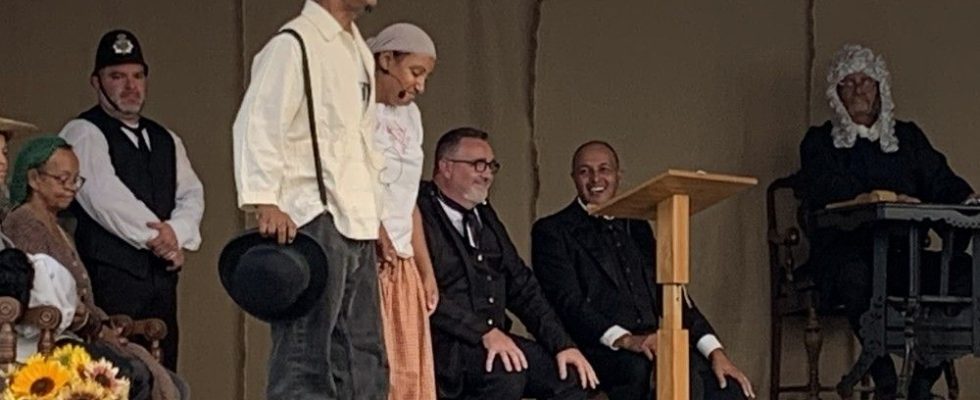BUXTON – Re-enactment here Sunday highlighted another interesting aspect of Black history of this hamlet where many slaves found freedom.

BUXTON – Re-enactment here Sunday highlighted another interesting aspect of Black history of this hamlet where many slaves found freedom.
Advertisement 2
Eight people, known as the Lemmon slaves, were part of a landmark court case in New York in 1852 that was portrayed in a re-enactment, titled: Angels Along The Way – The Lemmon Slave Case, performed by local actors Sunday during the 100th Buxton Homecoming celebrations.
In the autumn of 1852, Jonathan and Juliette Lemmon, with their seven children and eight slaves from Virginia planned to relocate to Texas. Through a series of events, the Lemmon family and their slaves end up in New York state, where their slaves learned they had an opportunity to gain their freedom.
Emeline, 23, and her sister Nancy, 20, took the risk, finding freedom in Buxton just before Christmas 1852.
However, the Lemmons took the matter to court to argue their right to keep their slaves, even though they had brought them to New York, which was a free state. Appeals against the original court ruling was spearheaded by the Virginia State Legislature and lasted for several years.
Advertisement 3

Retired New York judge Albert Rosenblatt who used to preside in the courtroom where the Lemmon slaves case was heard, spoke about his experience researching and writing his book, The Eight: The Lemmon Slave Case and the Fight for Freedom.
The court case, which was covered by newspapers across North America and Britain at the time, had faded from memory until Rosenblatt decided to read it through.
“From that point, it turned from an abstract legal holding into an experience of affection, where I got to know the real people behind it,” he said.
Rosenblatt, who attended the re-enactment in Buxton, said it was “a good, dramatic presentation which did show courage that took place in a very deplorable chapter of American history.”
Advertisement 4
Rosenblatt sees the presiding judge Elijah Paine as a hero.
“He made an unprecedented decision that no court in the United States had heard made.”
He added the attorney for the Lemmon slaves, Erastus Culver, was a great lawyer, who was extremely assertive.
However, Rosenblatt said the ultimate heroes were Emeline and Nancy Lemmon who had the courage to seek freedom “not knowing how the judge was going to rule.”
Rosenblatt was ready to send the book to the publisher never imagining he would locate descendants of the eight Lemmon slaves, because the public record ended when they were freed and took the Underground Railroad to freedom in Buxton.
While researching and writing the book, the retired judge would call on his historian friend Bryan Prince, a Buxton native who has extensively researched the history of slavery in North America.
Advertisement 5
Before sending the book to the publisher, he contacted Prince one more time to ask if he could “give me a hint of an iota of a sliver of a clue in which maybe we can find any of the descendants of the eight Lemmon slaves?”
He said Prince responded that he had reason to think Lewis Wright, one the seven-year-old twin brothers, along with Robert, who were among the Lemmon slaves, came to Lansing, Mich. after the Civil War.
After doing a genealogy search through a “mountain” of people named Louis Wright, Rosenblatt said he found a descendant named Randy West.
After contacting West and convincing him of his research, Rosenblatt recalled telling the Lemmon slave descendant, “Randy West, I have news for you. You are a living descendant of one of the most important cases not only in American slave history, but in American history.”
Advertisement 6
West introduced Rosenblatt to his cousin Luanne Wills-Merrell, who also attended the re-enactment Sunday in Buxton.
Wills-Merrell, whose great-great-great grandmother was Emeline Lemmon, said she had been researching her family history for 50 years, but kept hitting a dead-end at Emeline and her twin boys because she was going on wrong information she received from relative.
After a Zoom call with Rosenblatt, Prince and others in 2020, Wills-Merrell said she learned details of her family’s history she had never heard before.
Noting her head was spinning as she frantically wrote down this new information, Wills-Merrell said, “There’s a whole piece that we didn’t know that is a linchpin for American history.”
Advertisement 7
She said it is “indescribable” to learn this information. She also thinks of what her relatives have achieved, noting there are engineers and educators in her family.
Wills-Merrell also agrees Emeline and Nancy showed great courage and bravery to take that bold step to freedom.
“If it didn’t turn out well and they went back with their enslavers, I think they would have been chastised,” she said.
Rosenblatt said as he got to know the people involved in the court case “it took on a life of its own.”
When asked about being able to connect with Lemmon slave descendants, he said this was something he was working on for five years and “suddenly it moves into real life.
“It’s really one of the great events for me and personally gratifying to meet the good people and to share in what was really a triumph for justice,” Rosenblatt said.

Comments
Postmedia is committed to maintaining a lively but civil forum for discussion and encourages all readers to share their views on our articles. Comments may take up to an hour for moderation before appearing on the site. We ask you to keep your comments relevant and respectful. We have enabled email notifications—you will now receive an email if you receive a reply to your comment, there is an update to a comment thread you follow or if a user you follow comments. Visit our Community Guidelines for more information and details on how to adjust your email settings.
Join the Conversation